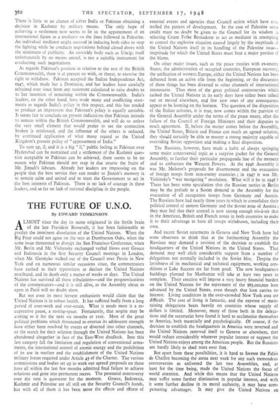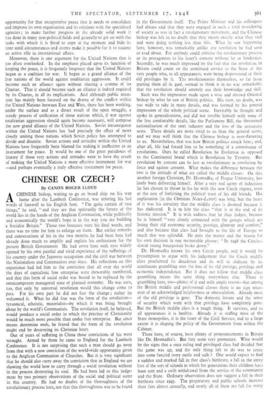THE FUTURE OF U.N.O.
By EDWARD TOMKINSON
ALMOST since the day its name originated in the fertile brain of the late President Roosevelt, it has been fashionable to predict the imminent dissolution of the United Nations. When the Big Four could not agree on the veto at Dumbarton Oaks, when the same issue threatened to disrupt the San Francisco Conference, when Mr. Bevin and Mr. Vishynsky exchanged verbal blows over Greece and Indonesia in the first Security Council meetings in London, when Mr. Gromyko walked out of the Council over Persia in New York and on numerous similar occasions since, the commentators have rushed to their typewriters to declare the United Nations moribund, and its death only a matter of weeks or days. The United Nations has survived all these tribulations—and the prognostications of the commentators—and it is still alive, as the Assembly about to open in Pug will no doubt show.
But not even its most fervent enthusiasts would claim that the United Nations is in robust health. It has suffered badly from a long period of over-work and over-strain. What it needs most is a re- cuperative pause, a resting-space. Fortunately, that respite may be coming to it for the next six months or year. Most of the great political problems which threatened to overtax its adolescent strength have either been resolved by events or diverted into other channels, or the search for their solution through the United Nations has been abandoned altogether in face of the East-West deadlock. Into this last category fall the limitation and regulation of conventional arma- ments, the international control of atomic energy and the prohibition of its use in warfare and the establishment of the United Nations military forces required under Article 43 of the Charter. The various commissions and bodies set up to work out agreed proposals on these have all within the last few months admitted final failure to achieve solutions and gone into permanent recess. The perennial controversy over the veto is quiescent for the moment. Greece, Indonesia, Kashmir and Palestine are all still on the Security Council's hands, • but with all of them it has been more the effects and efforts of external events and agencies than Council action which have con- trolled the pattern of development. In the case of Palestine some credit must no doubt be given to the Council for its wisdom in selecting Count Folke Bernadotte to act as mediator in attempting to control the explosive situation caused largely by the ineptitude of the United Nations itself in its handling of the Palestine issue— ineptitude for which the United States must bear a major portion of the blame.
On other major issues, such as the peace treaties with ex-enemy States, the administration of occupied countries, European recovery, the unification of western Europe, either the United Nations has been debarred from an active role from the beginning, or the discussion of these things has been diverted to other channels of international intercourse. Thus most of the great political controversies which racked the United Nations in its early days have either been talked out or moved elsewhere, and few new ones of any consequence appear to be looming on the horizon. The question of the disposition of the Italian colonies, it is true, now comes within the purview of the General Assembly under the terms of the peace treaty, after the failure of the Council of Foreign Ministers and their deputies to reach agreement. If, before the matter comes before the Assembly, the United States,. Britain and France can reach an agreed solution, they should certainly be able to muster a strong majority capable of overriding Soviet opposition and making a final disposition.
The Russians, however, have made a habit of always springing some major controversial topic as a surprise packet for the General Assembly, to further their particular propaganda line of the moment and to embarrass the Western Powers. At the 1946 Assembly it was Mr. Molotov's proposals for disarmament and the evacuation of foreign troops from non-enemy countries ; in 1947 it was Mr. Vishinsky's "war mongering" resolution. What will it be in 1948? There has been some speculation that the Russian tactics in Berlin may be the prelude to a Soviet demand at the Assembly for the evacuation of all occupation troops from Germany and Austria. The Russians have had nearly three years in which to consolidate their political control of eastern Germany and the Soviet zone of Austria ; they may feel that their control is now strong enough vis-a-vis that in the American, British and French zones in both countries to make it to their advantage to have all troops withdrawn, including their own.
And recent Soviet statements in Geneva and New York have led some observers to think that at the forthcoming Assembly the Russians may demand a revision of the decision to establish the headquarters of the United Nations in the United States. That demand may well elicit considerable support from a number of delegations not normally included in the Soviet bloc. Despite the lavishness of its mechanical and technical equipment, working con- ditions at Lake Success are far from good. The new headquarters buildings planned for Manhattan will take at least two years to complete. Their erection will impose a very heavy financial burden on the United Nations for the repayment of the $65,000,000 loan advanced by the United States, even though that loan carries no interest. Living conditions in the over-crowded New York area are difficult. The cost of living is fantastic, and the expense of main- taining delegations bears heavily on countries whose supply of dollars is limited. Moreover, many of those both in the delega- tions and the secretariat have found it hard to acclimatise themselves to America, both materially and psychologically. Of course, if the decision to establish the headquarters in America were reversed and the United Nations removed itself to Geneva or elsewhere, that would reduce considerably whatever popular interest or support the United Nations enjoys among the American people. But the Russians are hardly likely to shed tears over that.
But apart from these possibilities, it is hard to foresee the Palais de Chaillot becoming the arena next week for any such tremendous controversies as enlivened the last two Assemblies, and, at least for the time being, made the United Nations the focus of world attention. And while this means that the United Nations may suffer some further diminution in popular interest, and with it some further decline in its moral authority, it may have com- pensating advantages. It may give the United Nations an
opportunity for that recuperative pause that it needs to consolidate and improve its own organisation and its relations with the specialised agencies ; to make further progress in the already solid work it has done in many non-political fields and generally to get on with the tasks with which it is fitted to cope at the moment and bide its time until circumstances and events make it possible for it to resume an active role in international affairs.
Moreover, there is one argument for the United Nations that is too often overlooked. In the emphasis placed upon its function of keeping the peace, it is frequently forgotten that the United Nations began as a coalition for war. It began as a grand alliance of the free nations of the world against totalitarian aggression. It could become such an alliance again without altering a comma of its Charter. That it should become such an alliance is indeed required by its Charter, in all its implications. And although public atten- tion has mainly been focused on the drama of the conflict within the United Nations between East and West, there has been working, under the surface and as a direct result of the open struggle, a steady process of unification of those nations which, if war against totalitarian aggression should again become necessary, will compose the new grand alliance of the United Nations. Soviet intransigence within the United Nations has had precisely the effect of more closely uniting those nations which Soviet policy has attempted to divide and disunite. Soviet actions and attitudes within the United Nations have frequently been blamed for making it ineffective as an instrument for peace. It would be one of the great paradoxes of history if those very actions and attitudes were to have the result of making the United Nations a more effective instrument for war —and perhaps eventually a truly effective instrument for peace.



































 Previous page
Previous page